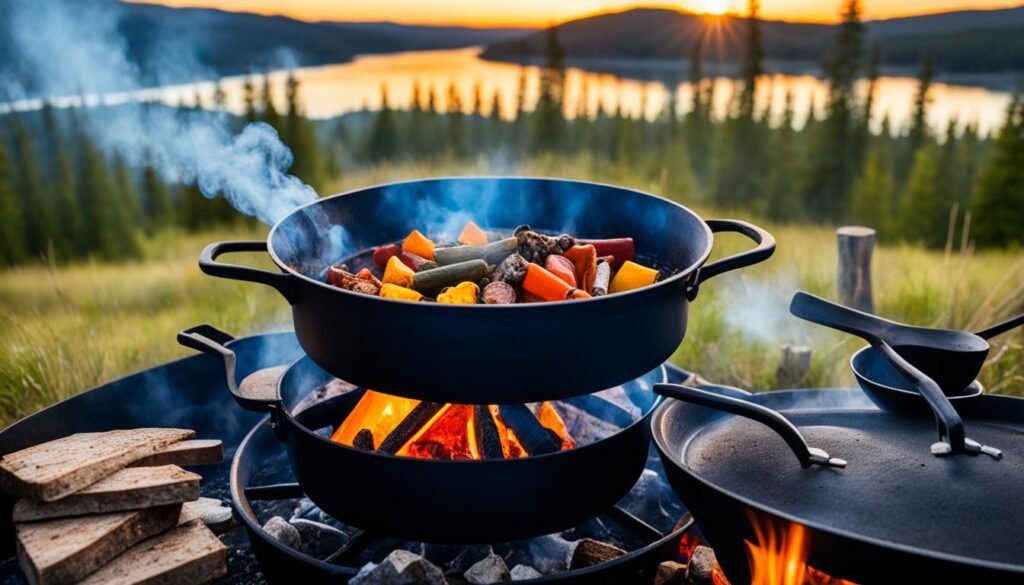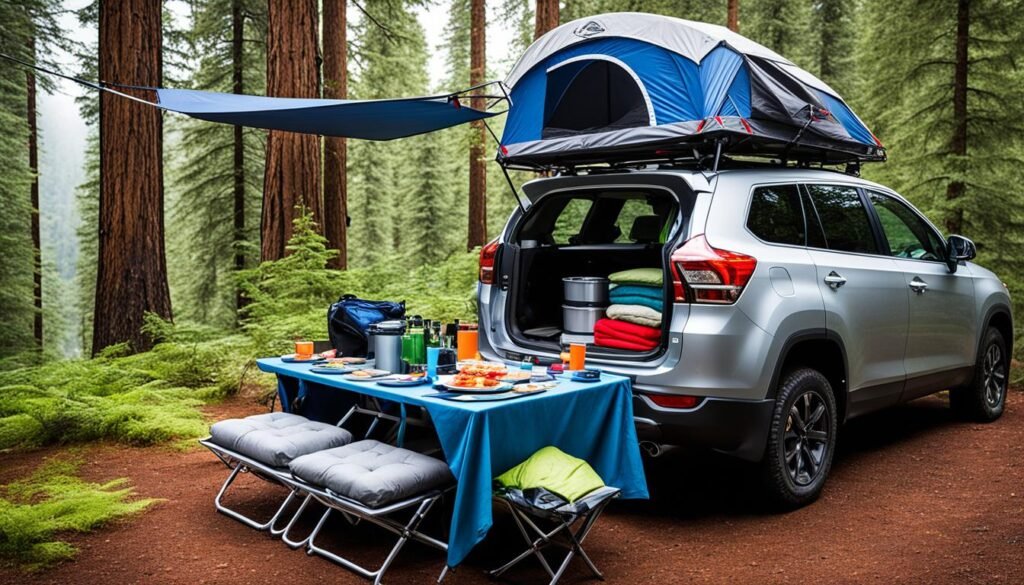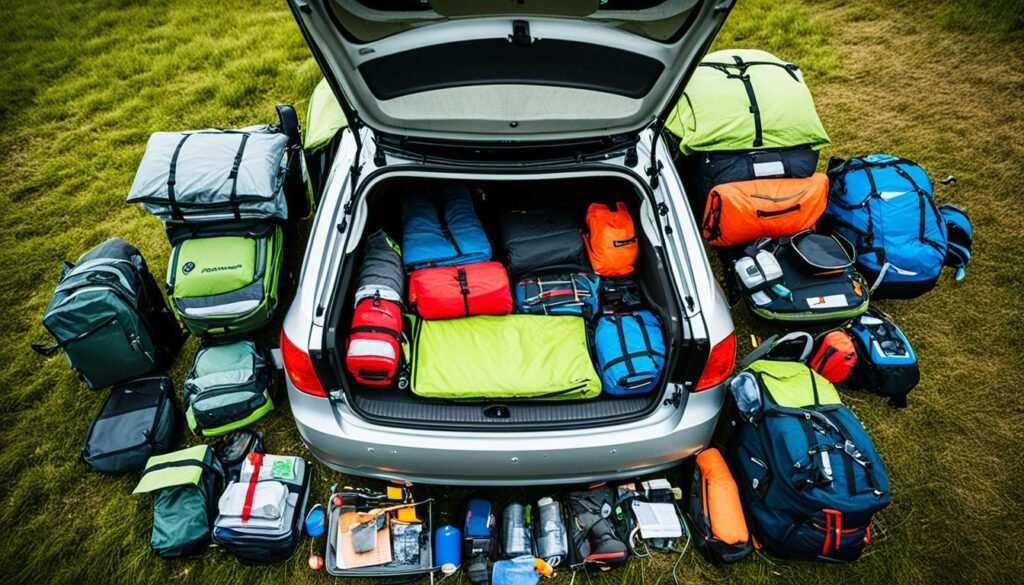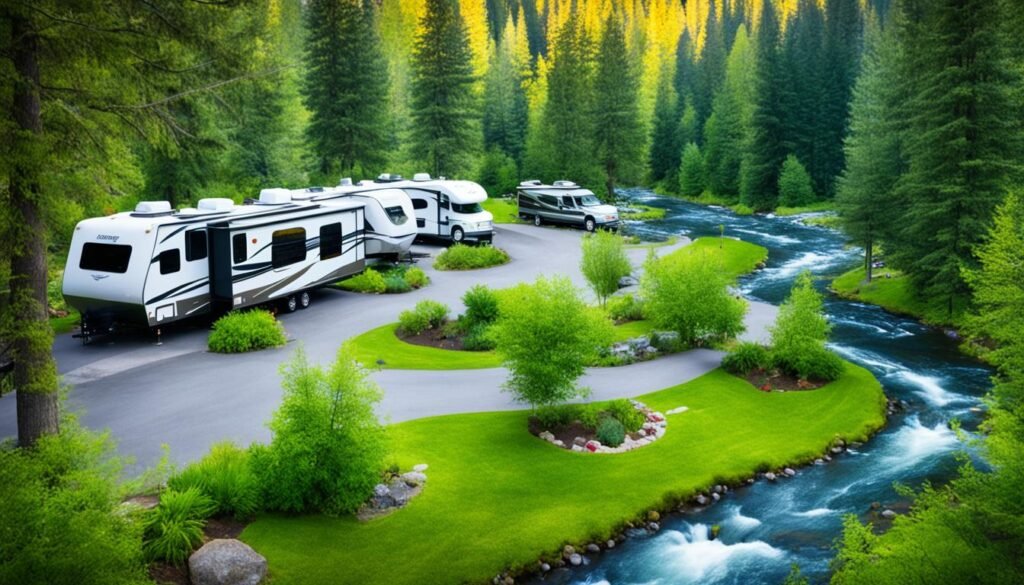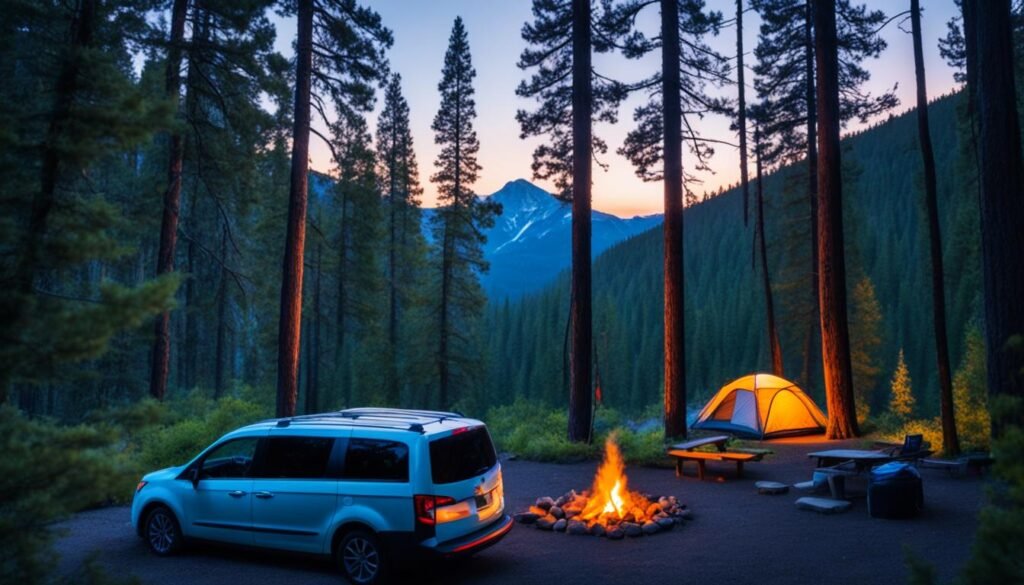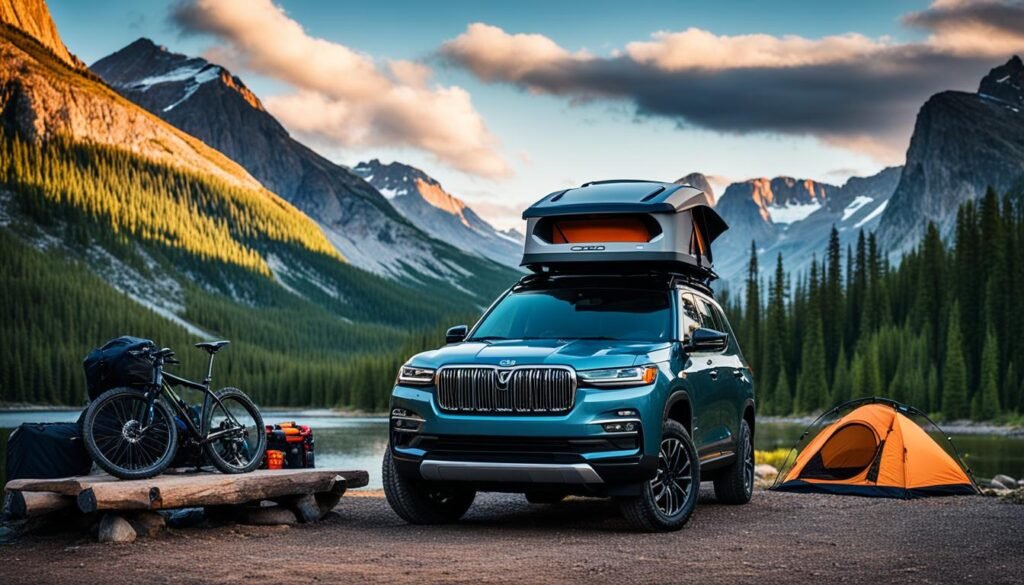When embarking on a car camping adventure, one of the common questions that arise is whether it’s safe to leave food in your vehicle. As food is an essential part of any camping trip, it’s crucial to know the best practices for food storage to ensure your provisions stay fresh and secure.
In this article, I will explore the topic of leaving food in your car during camping and provide valuable tips for storing food in your vehicle. From understanding food safety precautions to keeping your provisions secure from wildlife, this guide will cover all you need to know about car camping food storage.
Key Takeaways:
- Leaving food in your car while camping can be safe if you follow proper food safety precautions.
- Understanding food safety guidelines is essential to prevent contamination and ensure your provisions stay safe to consume.
- Proper food storage in your vehicle requires suitable containers, temperature considerations, and effective organizing techniques.
- Taking precautions to keep your provisions secure from wildlife is crucial to avoiding unwanted visitors at your campsite.
- Safe handling and preparation of camping food are essential for preventing foodborne illnesses.
Understanding Food Safety Precautions for Car Camping
Before deciding whether to leave food in your car during a camping trip, it’s essential to understand the food safety precautions associated with car camping. Proper food storage and handling are crucial to prevent contamination and ensure your provisions stay safe to consume.
When it comes to camping food safety, there are several key precautions to keep in mind:
- Keep it cool: Perishable foods such as meat, dairy products, and certain fruits and vegetables should be kept cold to prevent bacterial growth. Use coolers with ice packs or frozen gel packs to maintain a safe temperature.
- Separate raw and cooked items: To avoid cross-contamination, keep raw meats, poultry, and seafood separate from cooked foods. Wrap raw items securely and store them in leak-proof containers.
- Properly seal and package: Make sure all food containers are tightly sealed to prevent bugs and animals from accessing your provisions. Ziplock bags, plastic containers, and aluminum foil are excellent choices for storing your food.
- Plan your menu: Opt for non-perishable foods whenever possible. Canned goods, dried fruits, nuts, and granola bars are great options that don’t require refrigeration.
- Clean and sanitize: Keep your hands, utensils, and surfaces clean while preparing and handling food. Use soap and water or antibacterial wipes to wash your hands before cooking or eating.
By following these food safety precautions for camping, you can minimize the risk of foodborne illnesses and enjoy a safe and delicious outdoor dining experience.
“Proper food storage and handling are crucial to prevent contamination and ensure your provisions stay safe to consume.”
Tips for Storing Food in Your Vehicle While Camping
If you choose to store food in your car while camping, it’s crucial to follow specific guidelines to keep it fresh and protected. Proper food storage in vehicles is essential to prevent spoilage, maintain food safety, and ensure a positive camping experience. Here are some practical tips to help you store food properly in your vehicle:
1. Choose Suitable Containers
When storing food in your vehicle, it’s important to use containers that are durable, airtight, and leak-proof. Opt for containers made of BPA-free plastic, stainless steel, or glass that can withstand temperature changes and prevent odors from permeating.
2. Consider Temperature Considerations
Temperature control is key when storing food in your vehicle. Keep perishable items, such as raw meat and dairy products, in a cooler with ice packs or ice to maintain a safe temperature. Non-perishable items, like canned goods and dry snacks, can be stored at room temperature.
Store the cooler in the coolest part of your vehicle, such as the trunk or floor area, to minimize exposure to heat. Avoid placing the cooler directly on the seats or in direct sunlight, as this can lead to temperature fluctuations and potential food spoilage.
3. Organize Your Food
Proper organization can make a big difference when storing food in your vehicle. Use designated storage compartments, such as coolers, bins, or mesh organizers, to keep similar items together and prevent them from rolling around or getting squished during transport.
Consider labeling your containers or using color-coded bags to easily identify different types of food and improve overall organization. This will also help you access specific items without rummaging through the entire storage area.
4. Minimize Odors
To prevent attracting wildlife, it’s crucial to minimize food odors in your vehicle. Seal all food containers tightly to prevent smells from permeating the car. Consider using odor-proof bags or containers designed specifically for blocking odors.
It’s also a good practice to store strong-smelling items, like onions or garlic, separately or in double-sealed bags to prevent their aroma from spreading. Additionally, regularly clean and deodorize your car’s interior to remove any lingering food odors.
Remember to dispose of any food waste properly to avoid attracting animals to your campsite.
5. Follow Food Safety Guidelines
Even when storing food in your vehicle, it’s important to adhere to basic food safety guidelines. Wash your hands before handling food, use separate cutting boards for raw and cooked items, and avoid cross-contamination by keeping different food types separate.
Monitor the expiration dates of perishable items and discard anything past its prime. Regularly inspect the condition of your food containers to ensure they are intact and free from cracks or damage.
6. Plan for Easy Access
When storing food in your vehicle, consider the order in which you may need to access various items. Keep frequently used items within reach or at the top of coolers, while less frequently used items can be stored deeper inside.
If you’re storing multiple coolers, designate one for beverages and another for perishable food to prevent frequent opening and closing of the cooler containing perishables, which can affect temperature stability.
By following these tips, you can ensure that your food remains fresh, safe to eat, and protected while camping in your vehicle.
Keeping Your Provisions Secure from Wildlife
When camping and leaving food in your car, it’s essential to take precautions to protect your provisions from wildlife. Bears, raccoons, and squirrels are attracted to the scent of food and can cause significant damage to your vehicle. Here are some strategies to keep your food secure:
- Use bear-resistant containers: Invest in bear-resistant containers to store your food while camping. These containers are specially designed to withstand the strength and ingenuity of bears, keeping your provisions safe from their curious paws and sharp teeth.
- Store food away from your sleeping area: Avoid storing food inside your tent or near your sleeping area. Instead, keep it in a secure location like a locked trunk or bear locker.
- Dispose of food waste properly: Dispose of any food waste in a designated trash bin or by following campground guidelines. Do not leave food scraps or garbage scattered around your campsite, as this can attract wildlife.
- Minimize food odors: Seal all food containers tightly to minimize odors that could attract animals. Consider double-bagging your food or using odor-proof containers to further reduce the chances of wildlife detection.
- Keep a clean campsite: Maintain a clean campsite by regularly cleaning up crumbs, food spills, and garbage. This will help deter wildlife from approaching your area.
By following these strategies, you can significantly reduce the risk of wildlife encounters and keep your food provisions safe during your car camping trip.
| Wildlife Security Tips | Benefits |
|---|---|
| Use bear-resistant containers | Ensures food safety and prevents damage to your vehicle |
| Store food away from your sleeping area | Reduces the likelihood of wildlife approaching your tent |
| Dispose of food waste properly | Keeps your campsite clean and minimizes wildlife attraction |
| Minimize food odors | Reduces the chances of animals detecting and approaching your food |
| Keep a clean campsite | Maintains a deterrent environment for wildlife |
Safe Handling and Preparation of Camping Food
When it comes to camping, proper food handling and preparation are essential for keeping your meals safe and enjoyable. By following these guidelines for safe food practices during car camping, you can minimize the risk of foodborne illnesses and ensure a worry-free outdoor dining experience.
Proper Cooking Temperatures
One of the most important aspects of food safety is cooking food to the correct internal temperature. This kills harmful bacteria and ensures that the food is safe to eat. Use a food thermometer to check the internal temperature of meats, poultry, and seafood. Here are some general guidelines:
- Chicken and turkey: 165°F (74°C)
- Ground meats: 160°F (71°C)
- Beef, pork, veal, and lamb: 145°F (63°C) for medium-rare, 160°F (71°C) for medium, and 170°F (77°C) for well-done
- Fish: 145°F (63°C) or until the fish flakes easily with a fork
Avoiding Cross-Contamination
Cross-contamination occurs when bacteria from one food item spread to another. This can happen through direct contact or via utensils, cutting boards, or surfaces. To prevent cross-contamination:
- Keep raw meats, poultry, seafood, and their juices separate from other foods at all times.
- Use separate cutting boards and utensils for raw and cooked foods.
- Wash your hands thoroughly after handling raw meats or using utensils that have touched raw foods.
Appropriate Sanitation Practices
Maintaining proper sanitation is crucial for preventing the spread of bacteria. Follow these sanitation practices during car camping:
- Wash your hands with soap and water before and after handling food.
- Bring hand sanitizer or moist towelettes for occasions when soap and water are not available.
- Ensure all cooking utensils and surfaces are clean before use.
- Use clean water and soap to wash fruits and vegetables, even if they will be peeled or cooked.
- Store perishable foods in coolers with ice or freezer packs to maintain appropriate temperatures.
- Dispose of any leftover food or perishables that have been sitting out for more than two hours (or one hour if the temperature is above 90°F/32°C).
Safe Cooking Temperatures for Common Camping Foods
| Food Item | Safe Internal Temperature |
|---|---|
| Chicken and turkey | 165°F (74°C) |
| Ground meats | 160°F (71°C) |
| Beef, pork, veal, and lamb | 145°F (63°C) (medium-rare), 160°F (71°C) (medium), 170°F (77°C) (well-done) |
| Fish | 145°F (63°C) or until the fish flakes easily with a fork |
By following these guidelines for safe food practices during car camping, you can ensure that your camping meals are not only delicious but also safe to eat. Remember to cook food to the correct internal temperature, avoid cross-contamination, and practice proper sanitation at all times. Happy camping and bon appétit!
Coping with Limited Refrigeration Options
When embarking on a car camping adventure, one of the challenges you may face is limited refrigeration options. Without the convenience of a full-size refrigerator, it’s important to find alternative methods to keep your perishable food cool and fresh. In this section, I will share some helpful tips and tricks for storing food safely during your car camping trip.
Choose the Right Cooler
Investing in a high-quality cooler is key to maintaining the temperature of your food. Look for a cooler that has excellent insulation and a tight seal to prevent cold air from escaping. Consider the size and capacity of the cooler based on the number of days you plan to be camping and the amount of food you need to store.
Pre-Cool Your Cooler
Before packing your cooler, it’s a good idea to pre-cool it. This helps to create a cold environment that can better preserve the temperature of your food. One effective method is to fill the cooler with ice or ice packs the night before your trip. This allows the cooler to cool down and eliminates any initial heat that may be present.
Use Ice Packs and Block Ice
Ice packs and block ice are essential for keeping your food cold in a cooler. Unlike loose ice, they won’t melt and potentially soak your food. Ice packs are great for maintaining a consistent temperature and can be reused throughout your trip. Block ice, on the other hand, lasts longer and provides a more extended period of cooling.
| Ice Type | Duration | Pros | Cons |
|---|---|---|---|
| Ice Packs | 1-2 days | Reusable, compact | May not keep food frozen |
| Block Ice | 3-5 days | Long-lasting, better cooling | Can be bulky |
Separate Your Cooler Contents
Organizing your cooler can help maximize its efficiency. It’s essential to separate your food items into categories and keep them in individual containers or bags. This prevents cross-contamination and makes it easier to access what you need without constantly rummaging through the cooler.
Keep Your Cooler in the Shade
Placing your cooler in a shaded area can help maintain a lower temperature and prolong the life of your ice. Direct exposure to sunlight can rapidly increase the temperature inside the cooler, causing ice to melt faster. If possible, choose a shady spot and cover your cooler with a towel or blanket to provide extra insulation.
By following these tips, you can effectively cope with limited refrigeration options during your car camping trip. Remember to always prioritize food safety precautions for camping to ensure that your provisions remain fresh and safe to consume.
Pack and Prepare Non-Perishable Food Items
When planning your camping meals, it’s important to consider the shelf life of your food items. Packing and preparing non-perishable foods ensures that you have a reliable source of sustenance during your car camping trip. These items are less susceptible to spoilage and can be conveniently stored in your vehicle without the need for refrigeration.
Types of Non-Perishable Foods for Car Camping
Here are some excellent choices for non-perishable foods that are easy to pack and prepare:
- Canned Goods: Canned beans, vegetables, fruits, and meats are great options. They have a long shelf life and provide essential nutrients.
- Dried Fruits and Nuts: These snacks are not only delicious but also provide a good source of energy. They can be enjoyed as is or added to trail mix or granola bars.
- Jerky: Beef, turkey, or even vegan jerky is a versatile and protein-packed camping snack.
- Pasta and Rice: Dry pasta and rice can be cooked easily over a campfire or camp stove. They are filling and serve as a perfect base for various meals.
- Crackers and Bread: These pantry staples are excellent for making sandwiches or enjoying with spreads and toppings.
- Powdered or UHT Milk: These options are convenient for making coffee, tea, or adding to recipes that require milk.
- Instant Coffee or Tea Bags: For caffeine enthusiasts, these options provide a quick and easy way to prepare your favorite hot beverages.
- Canned Soups and Broths: These can serve as a hearty meal or a base for other dishes.
Remember to incorporate a variety of non-perishable foods into your camping menu to ensure a balanced diet. Additionally, consider any dietary restrictions or preferences of your camping companions.
Pro Tip: Label your non-perishable food items with the expiration dates before you leave for your camping trip. This way, you can easily keep track and consume the items before they expire.
Conclusion
After exploring the question “Can you leave food in your car during camping?”, it’s evident that with proper food safety practices and precautions, it can indeed be safe to store food in your vehicle while enjoying the outdoors. By following the guidelines discussed in this article, you can ensure the preservation and security of your provisions.
To begin, it is crucial to understand the importance of food safety precautions for car camping. Proper food storage and handling are essential to prevent contamination and maintain the quality of your food throughout your camping trip. Remember to store perishable items in suitable containers, consider the temperature inside the vehicle, and organize your provisions efficiently.
Additionally, it is imperative to protect your food supplies from wildlife. Leaving food in your car can attract bears, raccoons, and other critters to your campsite. To avoid unwanted encounters, use bear-resistant containers and store your food away from your sleeping area. Taking these measures will ensure both your safety and the well-being of the local wildlife.
In conclusion, by implementing safe food practices, understanding food safety precautions, and taking necessary steps to keep provisions secure, you can confidently leave food in your car during camping trips. Remember, adhering to these guidelines will allow you to enjoy worry-free car camping with fresh and safe food supplies.


